Backgrounder
Weibo From A to Z: A Look Back at the Biggest Trending Topics of 2016
Published
8 years agoon
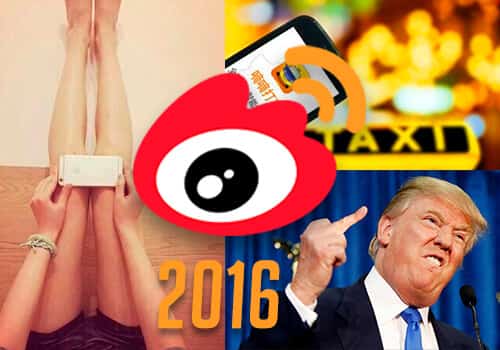
WHAT’S ON WEIBO ARCHIVE | PREMIUM CONTENT ARTICLE
What were the most discussed topics on Weibo of 2016? What’s on Weibo gives an overview of top stories on Chinese social media from A to Z: a look back at Weibo’s biggest trends of 2016.
As we are getting ready for a new year, What’s on Weibo reflects on the most popular trending stories on Chinese social media in 2016. It was a year where many things happened, from political controversies to online scandals and social hypes.
Sometimes the most trivial things got big, while the biggest things remained trivial. Time to list the China trending stories and digital trends of 2016 from A to Z.
———
#A is for Alipay,..the app for raunchy transactions

The A is for Alipay in this alphabet of 2016; not just because this Chinese ‘equivalent to Paypal’ is still the world’s leading third party payment platform, but also because the app made headlines in November when it launched a new group chat feature that soon turned into a ‘soft porn’ place.
The new social feature ‘Circles’ (生活圈) made it possible for users of a certain sex (female) to post, while only allowing other (male) users above a certain credit score to comment/interact. It triggered hundreds of women to post sexy pictures to tempt men or other users with a high credit score to spend some of their digital money. The groups were soon closed and Alipay CEO Peng Lei apologized, calling the incident “the most difficult” period of her Alipay career.
#B is for Baidu,..promoting false medical information

Another 2016 online scandal was exposed in May when the death of a 21-year-old cancer patient triggered heated discussions about Baidu’s paid search results. Through an online search on China’s biggest search engine Baidu, a young man named Wei Zexi found a promising treatment for with he spent 200,000 RMB (31,000US$). It later turned out to be a highly contested one, and the man soon died. Thousands of netizens criticized Baidu for offering a platform to shady health care providers.
The death of Wei Zexi did not only expose the spread of false medical information by Baidu, it also revealed a huge profit-driven healthcare market, in which Baidu and the fraudulent Putian Medical Group were running the show. Although the uproar led to a temporary shutdown of these ads, the same advertisements reappeared on the search engine in November.
#C is for Castro,..the “old friend of China”
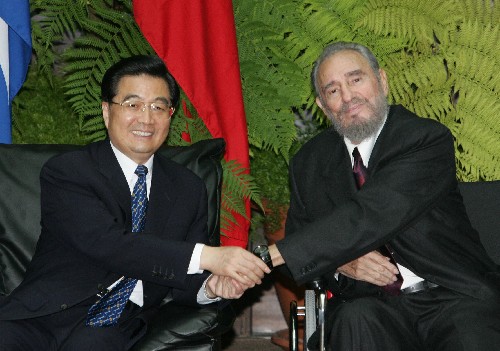
Shortly after news of his death came out, Cuban leader Fidel Castro became the number one trending topic on Weibo in November. Many Weibo users called Castro an “old friend of China”, expressing their condolences through thousands of digital candles. Under the leadership of Castro, China-Cuba relations became like those between “good comrades, good friends, and brothers”, as former president Hu Jintao described them. The Weibo topic on #卡斯特罗去世# was viewed over 99 million times.
#D is for Disneyland,..the grand opening in Shanghai

It was the most anticipated opening of the year. Disneyland Shanghai opened its doors on June 6 of 2016 to let the masses of people in who had been able to get their hands on the most wanted tickets of the year. Although Chinese netizens had been raving about the opening of the ‘happiest place on earth’ for months, the enthusiasm soon made place for complaints after the opening.
Many said the Disney trains in Shanghai were ugly and not nearly as beautiful as those in Hong Kong, the prices of snacks and drinks were deemed way too high, and many were troubled by the uncivilized behaviour of some visitors to the park.
#E is for Eleme,..China’s successful home-delivery app

The E in this alphabet perhaps not just stands for Eleme (饿了么) but the overall success of E-commerce in China in 2016. Home-grown delivery apps like Eleme, Baidu Takeout and Meituan were ubiquitous all over the first-tier cities of China this year. Delivery apps Eleme and Meituan became the focus of scrutiny when Chinese media revealed they were involved in illegal business by selling food from unlicensed restaurants.
With a heightened crackdown on street food, many unlicensed vendors chose to sell their food door-to-door via apps like Eleme, making them relatively ‘invisible’ to authorities. It has led to authorities keeping a closer eye on these delivery platforms.
#F is for Forbes Billionaires List,..China’s billionaires
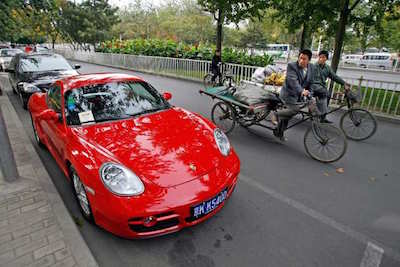
The release of the Forbes Billionaires List got Weibo talking about money and the world’s youngest billionaires this year. Although the very youngest multi-millionaire is not Chinese – but a 19-year-old Norwegian – the Forbes list revealed that China also has its fair share of young billionaires, with entrepreneur Wang Han becoming one of the world’s youngest billionaires at the age of 28. Check out our list on China’s youngest billionaires.
#G is for Gaga,..for meeting with the Dalai Lama
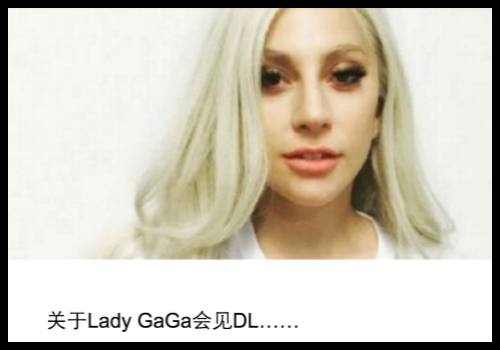
In the summer of 2016, Lady Gaga lost a lot of her Chinese fans after she met up with the Dalai Lama during a US conference in Indiana. After learning of Gaga’s support for the Dalai Lama, many netizens said that “Lady Gaga has officially left the Chinese market.”

Honourable mention: The #G for Gobi, the desert dog. The stray dog captured everyone’s heart after joining runner Dion Leonard on a 155-mile marathon across China. Netizens all rooted for Gobi after the dog got lost while in quarantine before joining Leonard to his home in Scotland, but after an amazing nine-day search, the little dog was found in Urumqi, and she is now on her way for a new life with her self-chosen owner Leonard in Scotland.
#H is for Hangzhou,..the heart of the G20

The whole world was looking at Hangzhou in September of this year as world leaders convened in the ancient Chinese city for the annual G20 summit. It marked China’s first time as host of the international forum – an important moment for China to once again emphasize its important role in the international community today.
But the G20 was also an opportunity for the city of Hangzhou to promote itself as a tourist destination. These efforts paid off so well that in the days following the G20 summit, the city was so packed that people could barely move. It also led to trash being left behind all over the city by visitors, with street cleaners removing as much as 14 tons of garbage within one day.
#I is for iPhone6 Legs,..another skinny trend

This was the year of different challenges taking over social media. There was the One Finger Selfie, the A4 waist challenge, and the much-discussed iPhone6 challenge.
Thousands of female netizens posted pictures on social media showing off how their smartphones could cover their skinny legs. Although many people later ridiculed the trend, there were also worries that these kinds of hypes promote unhealthy beauty standards. The majority of Weibo users, however, seemed to accept that an iPhone could never cover both their legs. Perhaps an iPad could.
#J is for Johan Cruyff,..the Dutch soccer hero

As What’s on Weibo is a blog that is both run from Amsterdam and Beijing, this topic especially touched our hearts this year. Dutch soccer hero Johan Cruyff passed away at the young age of 68 due to cancer, and became Weibo’s number one trending topic.
Within hours after news of the soccer legend’s death came out, thousands of Weibo users responded by posting candles and crying emoticons for what some called the “emperor of soccer” and “the world’s most legendary number 14.” Cruyff’s Chinese fans expressed their grief and their respect for his career: “The soccer world has lost its godfather, but your philosophy remains. Don’t forget to wear your soccer shoes in heaven. I salute you,” one fan said.
#K is for Kang Kang,..the missing CCTV mascotte
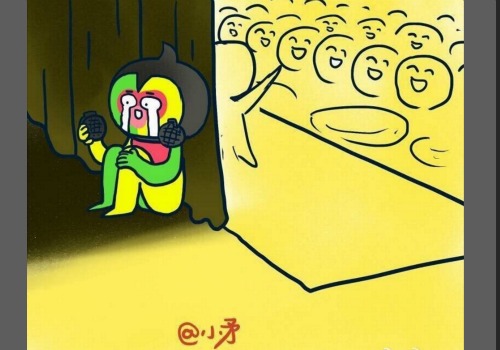
For the Year of the Monkey, CCTV launched its new official mascot of the Spring Festival Gala: Kang Kang the monkey. But when controversy arose over web users deeming the mascotte ‘ugly’ and ‘stupid’, Kang Kang suddenly was nowhere to be seen anymore.
It led to the burning question on Weibo: whatever happened Kang Kang the Monkey? Weibo netizens discussed the various reasons why Kang Kang did not come on the show, with some wondering if he left when he saw the show’s rehearsal and others suggesting they should file a missing’s person report. There were multiple netizens who thought Kang Kang might have carried ‘dangerous goods’ and did not pass the CCTV’s strict security checks. Kang Kang, unfortunately, was not be seen again.
#L is for Lei Yang,..who died due to police brutality
The death of Beijing resident Lei Yang (雷洋) was already called one of the biggest controversies of the year in May of 2016. When the 29-year-old environmentalist Lei Yang died shortly after his arrest at an alleged brothel, his story sparked national outrage over police brutality. “We could all be the next Lei Yang” was one of the phrases that soon made its rounds on Chinese social media. When Lei’s wife stepped forward demanding answers from Beijing authorities on the circumstances surrounding her husband’s death, she received massive support from China’s Weibo users.
According to further investigation by the Beijing prosecutor’s office, Lei Yang was found to have died due to choking. VOA recently reported that five officers involved in the case are expected to be charged with dereliction of duty in this case.
#M is for My Little Princess,..the hit TV drama

My Little Princess, a Chinese TV drama revolving around the trials and tribulations of Chinese rich kids attending college, is just one of the many Chinese TV dramas that became big trending topics on Weibo this year.
Other hit dramas were shows like The Interpreters, The Imperial Doctress, and countless others. The sucess of telenovelas like My Little Princess shows that Chinese audiencies just cannot get enough of TV drama – enjoying them together with a far broader audience outside of the People’s Republic.
#N is for the Noodle Gang,..Shanghai’s noodle maffia
A Shanghainese ‘Noodle War’ attracted the attention of Chinese netizens this year, as one noodle restaurant named Alilan openly shared its battle with a local Chinese Hui muslim community, that alleged the owner violated their code that there should be no other beef noodles restaurant within 400 meters of a Hui muslim restaurant.
As the ‘noodle community’ attempted to boycott the restaurant by standing in front of Alilan and blocking visitors from entering, Weibo netizens stepped up and showed their support by coming to dine at Alilan and resisting the boycott in great numbers. Weibo saved the restaurant, which is still running a successful business today. They thanked their fans for their help on their Weibo page earlier this month.
#O is for the Olympics,..that made Fu Yuanhui famous

The topics related to the Olympics might just have been the biggest topics of the year on Chinese social media. Whether it was about the helmets designed for the cycling team, the insulting comments about Chinese athletes made by a Canadian TV commentator, or the success of made-in-China products in Rio, the Olympics were the trending topic of the summer of 2016.
But only one Chinese athlete was the absolute winner of all Olympic-related topics. Swimmer Fu Yuanhui stole everyone’s hearts with her down-to-earth attitude and almost childlike facial expressions and talks about how she won at the Olympics with her ‘mystical powers.’ She also broke a sporting taboo by openly speaking about her period. With now over 8 million followers on her account, Fu Yuanhui has become a popular Weibo celebrity.
#P is for Papi Jiang,..the online celebrity of 2016

Papi Jiang rose to fame in 2016 and went from a lonely vlogger to one of China’s most beloved online celebrities – seemingly overnight. The Weibo superstar was the ‘new kid on the block’ in March of 2016 with her witty online videos in which she commented on anything from family interactions to dating etiquette.
In April 2016, the power of Weibo’s celebrity economy became clear when an ad auction showed that companies were willing to pay up to 22 million RMB (3,4 million US$) to get Papi Jiang connected to their brand. It showed that 2016 was THE year of Weibo’s celebrity economy. Papi now has over 20 million followers on her Weibo account, and still frequently posts funny videos.
#Q is for Qiaobi,..the ‘most racist’ commercial of the year

A Chinese washing powder commercial went viral outside of China this year for being “jaw-droppingly racist.” The commercial shows how a black man is turned down by a Chinese woman, who puts him in a washing machine – after which he comes out as a Chinese man.
Within China, the ad initially stirred no controversy – it seemed that no one had even heard about the ad – until international media controversy also blew over to Weibo. Different websites soon exposed that the Chinese commercial was copied from a 2006 Italian ad where a white man turns into a black man after being ‘washed’. On May 30, Chinese media reported that Qiaobi had taken the commercial down and had apologized in response to the outrage it caused.
#R is for Red Alert,..the smog ‘airpocalypse’

Since Beijing’s first red alert for smog was issued in December of 2015, the ‘smog alert’ has become a recurring topic on Chinese social media. The red alert for smog of December 2016 especially triggered many comments on Weibo this year when 400 students in Henan, Anyang, had to take their exams outdoors in heavy smog while their school was officially closed due to the smog. The principal has since been suspended.
#S is for SK-II,..the brand that opened up the ‘Leftover Women’ discussion
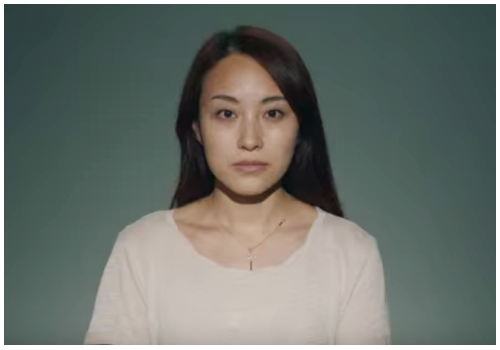
A short film about China’s leftover women by skincare brand SK-II became a hot topic on Chinese & international social media in April of 2016. Many netizens were touched by the video’s message about choosing personal happiness over society’s expectations.
Although the ‘Change Destiny’ ad campaign also received some criticism, most people seemed to agree that the video send out the right message: that women, despite the pressure to get married, should pluck up the courage to speak out and get their voices heard.
#T is for Trump..from hero to zero on Weibo
Trump undeniably is the biggest name of 2016. On Chinese social media, many people initially showed their support for Trump for his humor, pragmatism, war against political correctness, but also because many thought he was a better option than Hillary Clinton.
But soon after Trump was elected, the enthusiasm subdued when the newly elected US president spoke with Taipei president Tsai Ing-wen and suggested in a Fox News that he could drop the “One China” policy. Trump’s recent moves have caused confusion on Chinese social media, although there are also Chinese netizens who say that China will win, no matter what Trump’s future plans may be.
#U is for Uber,..merging with Didi Chuxing
American ride-hailing app Uber had a bumpy ride in China, where was losing over $1 billion a year since it started its PRC adventure in 2013. Uber China was facing the fierce competition from homegrown Uber-equivalent Didi Kuaidi (later: ‘Didi Chuxing’) which was doing a staggering 10 million rides a day in China while Uber was doing only 2 million rides a day worldwide.
In August 2016, Uber China finally gave up its Chinese e-hailing war with Didi, and merged with its rival. It led to many complains on Weibo, with higher prices and bothered passengers. The original Uber app has closed down and was replaced by an app specially made for the Chinese market.
#V is for the Big V-s,..making Weibo big

Although China’s biggest social media platform Sina Weibo was previously practically pronounced dead by international media, this year was the year of Weibo’s revival.
One of the main reasons for Weibo’s success is the popularity of so-called ‘Big V’s’ – popular microbloggers who have a ‘v’ behind their name as their accounts have been verified by Weibo. These social media celebrities vary from comedians to fashion bloggers or make-up stylists who offer great marketing potential for brands because they have a huge following, much influence, and often the right target audiences. While Weibo helps online celebrities grow big, these online celebrities also helped Weibo revive by boosting the number of active monthly users who come to see what their idols are up to.
#W is for Wang Baoqiang,..the divorce of the year
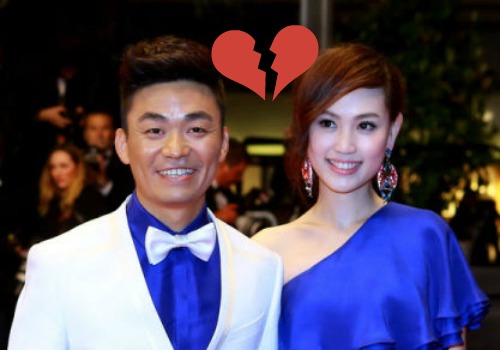
The probable winner in this list of Weibo’s trending topics of 2016 is the divorce of Wang Baoqiang. The popular migrant worker-turned-actor publicly announced on Weibo that he was divorcing his wife Ma Rong for cheating on him with his manager. It led to an unprecedented stream of comments, with the majority of Weibo netizens supporting Wang and hating on Ma Rong.
While an audience of millions seeing the love drama unfold, Ma Rong took revenge by blaming her estranged husband for abandoning his friends and family, and sueing him for defamation of character.
#X is for Xiaomi,..China’s winning smartphone
After Single’s Day, China’s biggest online shopping festival of the year, it became clear that ‘made-in-China’ smartphones and tablets were the big winners this year.
Although iPhone7 still made considerable sales, made-in-China smartphones were the undeniable winner of the Single’s Day smartphone sales. Overall, netizens bought more Chinese smartphone brands than international ones. According to the sales numbers of JD.com, no less than 8 of the top 10 best-selling smartphones were domestically produced mobile phones. China’s Xiaomi brand did especially well. With the Mi 6 coming out in 2017, the brand can expect to gain more Xiaomi lovers in the coming year.
#Y is for Yulin,..China’s most controversial local festival
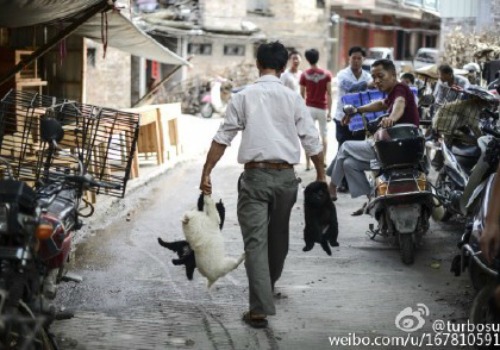
Year on year, the annual Yulin dog meat festival has been receiving more attention internationally, with more celebrities and politicians condemning the event. The tradition has previously mainly sparked outrage outside of China, but is also getting more criticism within the PRC; 62% Chinese surveyees now think the dog meat festival harms China’s international reputation. This year, China’s Foreign Ministry spokesperson Hua Chunying clarified that the Yulin government has never supported or organized the festival, and that it is a local initiative – a controversial one.
#Z is for Zhang Guoli,..who was quoted before he spoke
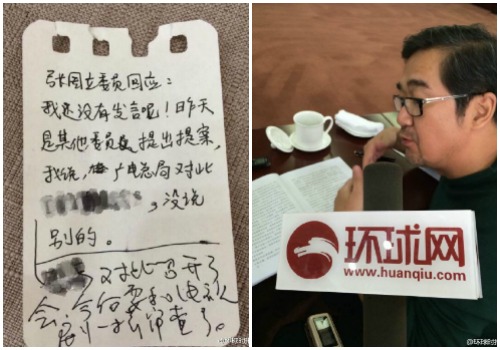
An awkward moment on Chinese state media got people talking during the Plenary Sessions in March when CCTV reported that actor and director Zhang Guoli advocated for stronger monitoring of web dramas at China’s plenary sessions, and when the actor posted on Weibo that he had not spoken at all yet.
Although Zhang Guoli’s comment was soon deleted or removed by Weibo’s censors, it had already caught the widespread attention of Weibo’s netizens. “The media is always like this,” one netizen responds: “they report about a speech before someone has actually spoken!”
———
What’s on Weibo wants to thank you for following us over the past year, in which we have grown into much cited and much visited independent news blog on China. Please keep connected in the year to come for all of China’s social trends.
New year’s greetings from What’s on Weibo’s 2016 writer’s team.
– By Manya Koetse
Follow on Twitter or Like on Facebook
©2016 Whatsonweibo. All rights reserved. Do not reproduce our content without permission – you can contact us at info@whatsonweibo.com.
Manya Koetse is the founder and editor-in-chief of whatsonweibo.com. She is a writer, public speaker, and researcher (Sinologist, MPhil) on social trends, digital developments, and new media in an ever-changing China, with a focus on Chinese society, pop culture, and gender issues. She shares her love for hotpot on hotpotambassador.com. Contact at manya@whatsonweibo.com, or follow on Twitter.

Backgrounder
“Oppenheimer” in China: Highlighting the Story of Qian Xuesen
Qian Xuesen is a renowned Chinese scientist whose life shares remarkable parallels with Oppenheimer’s.
Published
10 months agoon
September 16, 2023By
Zilan Qian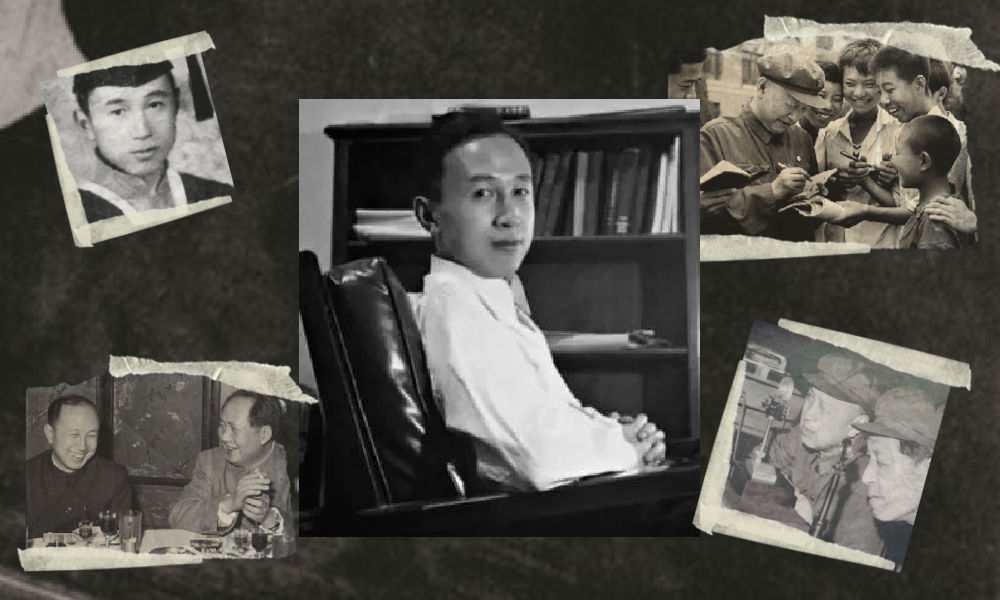
They shared the same campus, lived in the same era, and both played pivotal roles in shaping modern history while navigating the intricate interplay between science and politics. With the release of the “Oppenheimer” movie in China, the renowned Chinese scientist Qian Xuesen is being compared to the American J. Robert Oppenheimer.
In late August, the highly anticipated U.S. movie Oppenheimer finally premiered in China, shedding light on the life of the famous American theoretical physicist J. Robert Oppenheimer (1904-1967).
Besides igniting discussions about the life of this prominent scientist, the film has also reignited domestic media and public interest in Chinese scientists connected to Oppenheimer and nuclear physics.
There is one Chinese scientist whose life shares remarkable parallels with Oppenheimer’s. This is aerospace engineer and cyberneticist Qian Xuesen (钱学森, 1911-2009). Like Oppenheimer, he pursued his postgraduate studies overseas, taught at Caltech, and played a pivotal role during World War II for the US.
Qian Xuesen is so widely recognized in China that whenever I introduce myself there, I often clarify my last name by saying, “it’s the same Qian as Qian Xuesen’s,” to ensure that people get my name.
Some Chinese blogs recently compared the academic paths and scholarly contributions of the two scientists, while others highlighted the similarities in their political challenges, including the revocation of their security clearances.
The era of McCarthyism in the United States cast a shadow over Qian’s career, and, similar to Oppenheimer, he was branded as a “communist suspect.” Eventually, these political pressures forced him to return to China.
Although Qian’s return to China made his later life different from Oppenheimer’s, both scientists lived their lives navigating the complex dynamics between science and politics. Here, we provide a brief overview of the life and accomplishments of Qian Xuesen.
Departing: Going to America
Qian Xuesen (钱学森, also written as Hsue-Shen Tsien), often referred to as the “father of China’s missile and space program,” was born in Shanghai in 1911,1 a pivotal year marked by a historic revolution that brought an end to the imperial dynasty and gave rise to the Republic of China.
Much like Oppenheimer, who pursued further studies at Cambridge after completing his undergraduate education, Qian embarked on a journey to the United States following his bachelor’s studies at National Chiao Tung University (now Shanghai Jiao Tong University). He spent a year at Tsinghua University in preparation for his departure.
The year was 1935, during the eighth year of the Chinese Civil War and the fourth year of Japan’s invasion of China, setting the backdrop for his academic pursuits in a turbulent era.
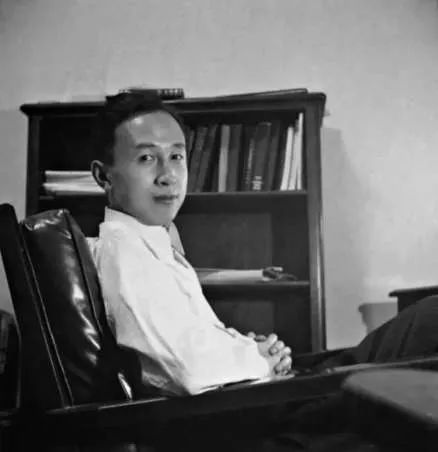
Qian in his office at Caltech (image source).
One year after arriving in the U.S., Qian earned his master’s degree in aeronautical engineering from the Massachusetts Institute of Technology (MIT). Three years later, in 1939, the 27-year-old Qian Xuesen completed his PhD at the California Institute of Technology (Caltech), the very institution where Oppenheimer had been welcomed in 1927. In 1943, Qian solidified his position in academia as an associate professor at Caltech. While at Caltech, Qian helped found NASA’s Jet Propulsion Laboratory.
When World War II began, while Oppenheimer was overseeing the Manhattan Project’s efforts to assist the U.S. in developing the atomic bomb, Qian actively supported the U.S. government. He served on the U.S. government’s Scientific Advisory Board and attained the rank of lieutenant colonel.

The first meeting of the US Department of the Air Force Scientific Advisory Board in 1946. The predecessor, the Scientific Advisory Group, was founded in 1944 to evaluate the aeronautical programs and facilities of the Axis powers of World War II. Qian can be seen standing in the back, the second on the left (image source).
After the war, Qian went to teach at MIT and returned to Caltech as a full-time professor in 1949. During that same year, Mao Zedong proclaimed the establishment of the People’s Republic of China (PRC). Just one year later, the newly-formed nation became involved in the Korean War, and China fought a bloody battle against the United States.
Red Scare: Being Labeled as a Communist
Robert Oppenheimer and Qian Xuesen both had an interest in Communism even prior to World War II, attending communist gatherings and showing sympathy towards the Communist cause.
Qian and Oppenheimer may have briefly met each other through their shared involvement in communist activities. During his time at Caltech, Qian secretly attended meetings with Frank Oppenheimer, the brother of J. Robert Oppenheimer (Monk 2013).
However, it was only after the war that their political leanings became a focal point for the FBI.
Just as the FBI accused Oppenheimer of being an agent of the Soviet Union, they quickly labeled Qian as a subversive communist, largely due to his Chinese heritage. While the government did not succeed in proving that Qian had communist ties with China during that period, they did ultimately succeed in portraying Qian as a communist affiliated with China a decade later.
During the transition from the 1940s to the 1950s, the Cold War was underway, and the anti-communist witch-hunts associated with the McCarthy era started to intensify (BBC 2020).
In 1950, the Korean War erupted, with the People’s Republic of China (PRC) joining North Korea in the conflict against South Korea, which received support from the United States. It was during this tumultuous period that the FBI officially accused Qian of communist sympathies in 1950, leading to the revocation of his security clearance despite objections from Qian’s colleagues. Four years later, in 1954, Robert Oppenheimer went through a similar process.
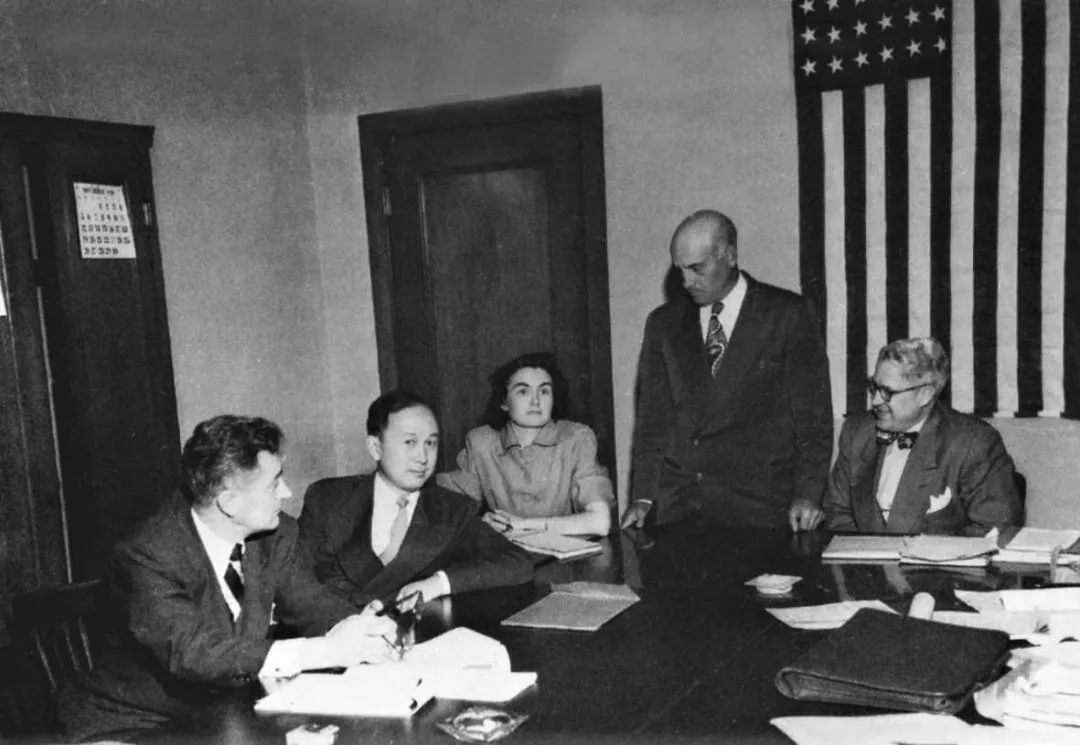
The 1950’s security hearing of Qian (second left). (Image source).
After losing his security clearance, Qian began to pack up, saying he wanted to visit his aging parents back home. Federal agents seized his luggage, which they claimed contained classified materials, and arrested him on suspicion of subversive activity. Although Qian denied any Communist leanings and rejected the accusation, he was detained by the government in California and spent the next five years under house arrest.
Five years later, in 1955, two years after the end of the Korean War, Qian was sent home to China as part of an apparent exchange for 11 American airmen who had been captured during the war. He told waiting reporters he “would never step foot in America again,” and he kept his promise (BBC 2020).
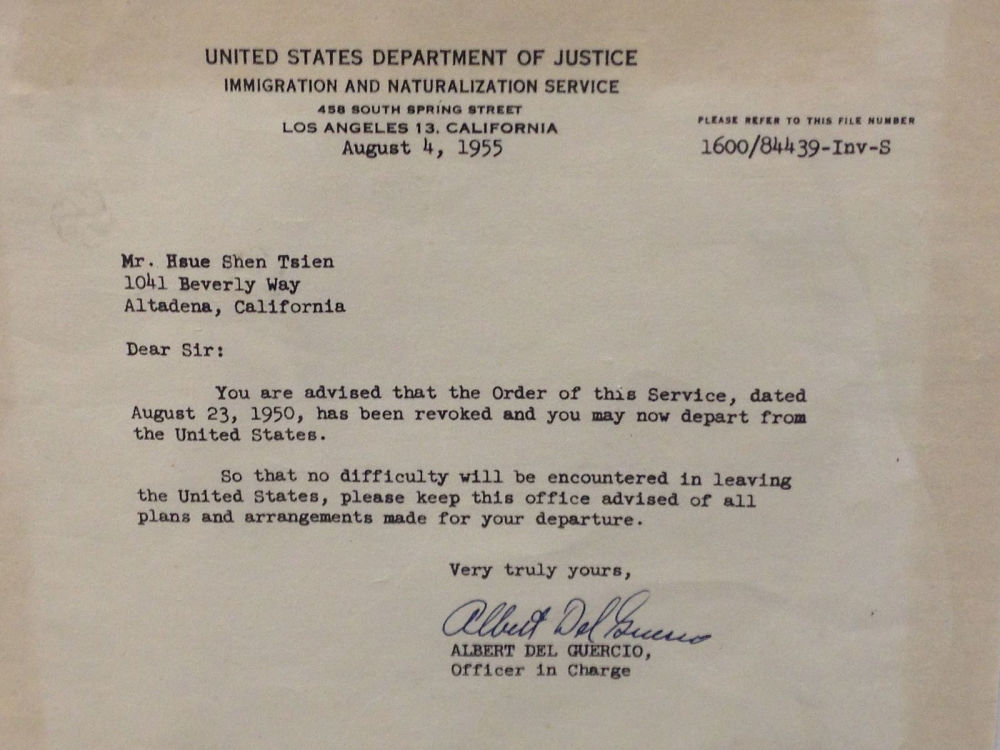
A letter from the US Immigration and Naturalization Service to Qian Xuesen, dated August 4, 1955, in which he was notified he was allowed to leave the US. The original copy is owned by Qian Xuesen Library of Shanghai Jiao Tong University, where the photo was taken. (Caption and image via wiki).
Dan Kimball, who was the Secretary of the US Navy at the time, expressed his regret about Qian’s departure, reportedly stating, “I’d rather shoot him dead than let him leave America. Wherever he goes, he equals five divisions.” He also stated: “It was the stupidest thing this country ever did. He was no more a communist than I was, and we forced him to go” (Perrett & Bradley, 2008).
Kimball may have foreseen the unfolding events accurately. After his return to China, Qian did indeed assume a pivotal role in enhancing China’s military capabilities, possibly surpassing the potency of five divisions. The missile programme that Qian helped develop in China resulted in weapons which were then fired back on America, including during the 1991 Gulf War (BBC 2020).
Returning: Becoming a National Hero
The China that Qian Xuesen had left behind was an entirely different China than the one he returned to. China, although having relatively few experts in the field, was embracing new possibilities and technologies related to rocketry and space exploration.
Within less than a month of his arrival, Qian was welcomed by the then Vice Prime Minister Chen Yi, and just four months later, he had the honor of meeting Chairman Mao himself.
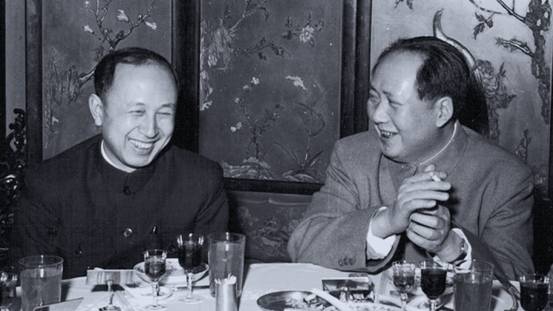
Qian and Mao (image source).
In China, Qian began a remarkably successful career in rocket science, with great support from the state. He not only assumed leadership but also earned the distinguished title of the “father” of the Chinese missile program, instrumental in equipping China with Dongfeng ballistic missiles, Silkworm anti-ship missiles, and Long March space rockets.
Additionally, his efforts laid the foundation for China’s contemporary surveillance system.
By now, Qian has become somewhat of a folk hero. His tale of returning to China despite being thwarted by the U.S. government has become like a legendary narrative in China: driven by unwavering patriotism, he willingly abandoned his overseas success, surmounted formidable challenges, and dedicated himself to his motherland.
Throughout his lifetime, Qian received numerous state medals in recognition of his work, establishing him as a nationally celebrated intellectual. From 1989 to 2001, the state-launched public movement “Learn from Qian Xuesen” was promoted throughout the country, and by 2001, when Qian turned 90, the national praise for him was on a similar level as that for Deng Xiaoping in the decade prior (Wang 2011).
Qian Xuesen remains a celebrated figure. On September 3rd of this year, a new “Qian Xuesen School” was established in Wenzhou, Zhejiang Province, becoming the sixth high school bearing the scientist’s name since the founding of the first one only a year ago.

In 2017, the play “Qian Xuesen” was performed at Qian’s alma mater, Shanghai Jiaotong University. (Image source.)
Qian Xuesen’s legacy extends well beyond educational institutions. His name frequently appears in the media, including online articles, books, and other publications. There is the Qian Xuesen Library and a museum in Shanghai, containing over 70,000 artefacts related to him. Qian’s life story has also been the inspiration for a theater production and a 2012 movie titled Hsue-Shen Tsien (钱学森).2
Unanswered Questions
As is often the case when people are turned into heroes, some part of the stories are left behind while others are highlighted. This holds true for both Robert Oppenheimer and Qian Xuesen.
The Communist Party of China hailed Qian as a folk hero, aligning with their vision of a strong, patriotic nation. Many Chinese narratives avoid the debate over whether Qian’s return was linked to problems and accusations in the U.S., rather than genuine loyalty to his homeland.
In contrast, some international media have depicted Qian as a “political opportunist” who returned to China due to disillusionment with the U.S., also highlighting his criticism of “revisionist” colleagues during the Cultural Revolution and his denunciation of the 1989 student demonstrations.
Unlike the image of a resolute loyalist favored by the Chinese public, Qian’s political ideology was, in fact, not consistently aligned, and there were instances where he may have prioritized opportunity over loyalty at different stages of his life.
Qian also did not necessarily aspire to be a “flawless hero.” Upon returning to China, he declined all offers to have his biography written for him and refrained from sharing personal information with the media. Consequently, very little is known about his personal life, leaving many questions about the motivations driving him, and his true political inclinations.

The marriage photo of Qian and Jiang. (Image source).
We do know that Qian’s wife, Jiang Ying (蒋英), had a remarkable background. She was of Chinese-Japanese mixed race and was the daughter of a prominent military strategist associated with Chiang Kai-shek. Jiang Ying was also an accomplished opera singer and later became a professor of music and opera at the Central Conservatory of Music in Beijing.
Just as with Qian, there remain numerous unanswered questions surrounding Oppenheimer, including the extent of his communist sympathies and whether these sympathies indirectly assisted the Soviet Union during the Cold War.
Perhaps both scientists never imagined they would face these questions when they first decided to study physics. After all, they were scientists, not the heroes that some narratives portray them to be.
Also read:
■ Farewell to a Self-Taught Master: Remembering China’s Colorful, Bold, and Iconic Artist Huang Yongyu
■ “His Name Was Mao Anying”: Renewed Remembrance of Mao Zedong’s Son on Chinese Social Media
By Zilan Qian
Follow @whatsonweibo
1 Some sources claim that Qian was born in Hangzhou, while others say he was born in Shanghai with ancestral roots in Hangzhou.
2The Chinese character 钱 is typically romanized as “Qian” in Pinyin. However, “Tsien” is a romanization in Wu Chinese, which corresponds to the dialect spoken in the region where Qian Xuesen and his family have ancestral roots.
This article has been edited for clarity by Manya Koetse
References (other sources hyperlinked in text)
BBC. 2020. “Qian Xuesen: The man the US deported – who then helped China into space.” BBC.com, 27 October https://www.bbc.com/news/stories-54695598 [9.16.23].
Monk, Ray. 2013. Robert Oppenheimer: A Life inside the Center, First American Edition. New York: Doubleday.
Perrett, Bradley, and James R. Asker. 2008. “Person of the Year: Qian Xuesen.” Aviation Week and Space Technology 168 (1): 57-61.
Wang, Ning. 2011. “The Making of an Intellectual Hero: Chinese Narratives of Qian Xuesen.” The China Quarterly, 206, 352-371. doi:10.1017/S0305741011000300
Get the story behind the hashtag. Subscribe to What’s on Weibo here to receive our newsletter and get access to our latest articles:
Spotted a mistake or want to add something? Please let us know in comments below or email us. First-time commenters, please be patient – we will have to manually approve your comment before it appears.
©2023 Whatsonweibo. All rights reserved. Do not reproduce our content without permission – you can contact us at info@whatsonweibo.com.
Backgrounder
Farewell to a Self-Taught Master: Remembering China’s Colorful, Bold, and Iconic Artist Huang Yongyu
Renowned Chinese artist and the creator of the ‘Blue Rabbit’ zodiac stamp Huang Yongyu has passed away at the age of 98. “I’m not afraid to die. If I’m dead, you may tickle me and see if I smile.”
Published
1 year agoon
June 15, 2023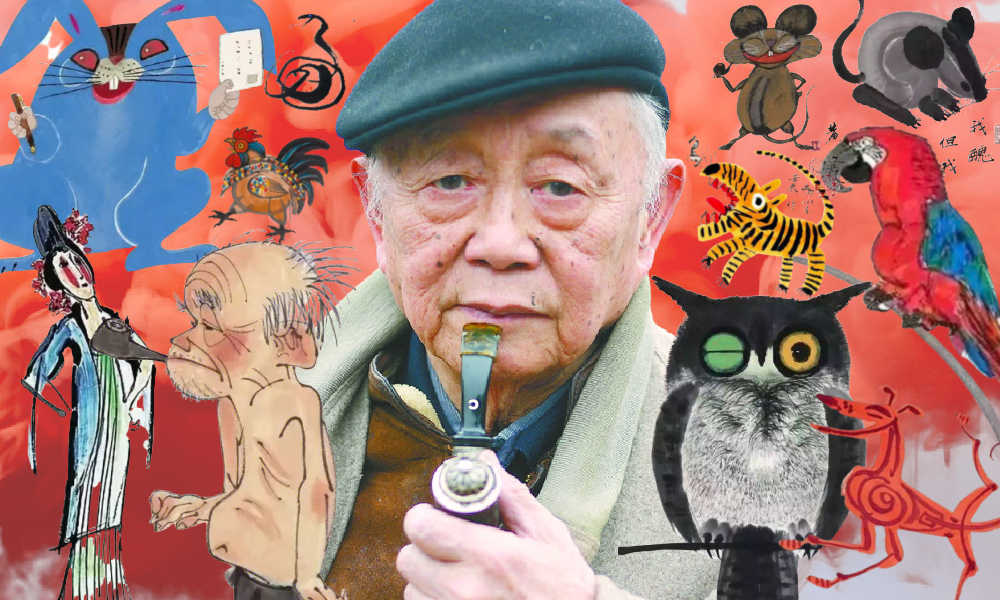
The famous Chinese painter, satirical poet, and cartoonist Huang Yongyu has passed away. Born in 1924, Huang endured war and hardship, yet never lost his zest for life. When his creativity was hindered and his work was suppressed during politically tumultuous times, he remained resilient and increased “the fun of living” by making his world more colorful.
He was a youthful optimist at old age, and will now be remembered as an immortal legend. The renowned Chinese painter and stamp designer Huang Yongyu (黄永玉) passed away on June 13 at the age of 98. His departure garnered significant attention on Chinese social media platforms this week.
On Weibo, the hashtag “Huang Yongyu Passed Away” (#黄永玉逝世#) received over 160 million views by Wednesday evening.
Huang was a member of the China National Academy of Painting (中国国家画院) as well as a Professor at the Central Academy of Fine Arts (中央美术学院).
Huang Yongyu is widely recognized in China for his notable contribution to stamp design, particularly for his iconic creation of the monkey stamp in 1980. Although he designed a second monkey stamp in 2016, the 1980 stamp holds significant historical importance as it marked the commencement of China Post’s annual tradition of releasing zodiac stamps, which have since become highly regarded and collectible items.
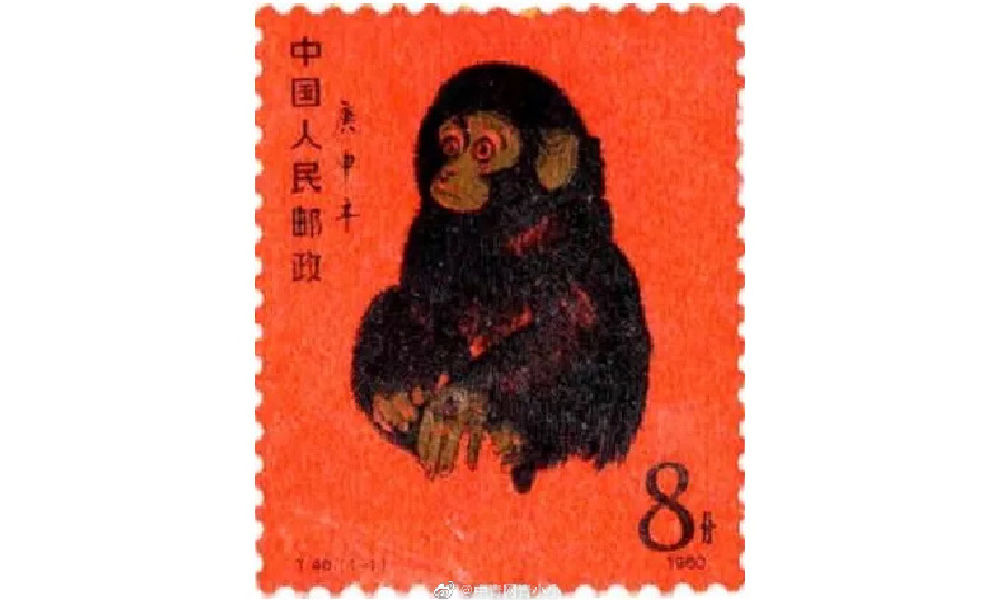
Huang’s famous money stamp that was issued by China Post in 1980.
The monkey stamp designed by Huang Yongyu has become a cherished collector’s item, even outside of China. On online marketplaces like eBay, individual stamps from this series are being sold for approximately $2000 these days.
Huang Yongyu’s latest most famous stamp was this year’s China Post zodiac stamp. The stamp, a blue rabbit with red eyes, caused some online commotion as many people thought it looked “horrific.”
Some thought the red-eyed blue rabbit looked like a rat. Others thought it looked “evil” or “monster-like.” There were also those who wondered if the blue rabbit looked so wild because it just caught Covid.
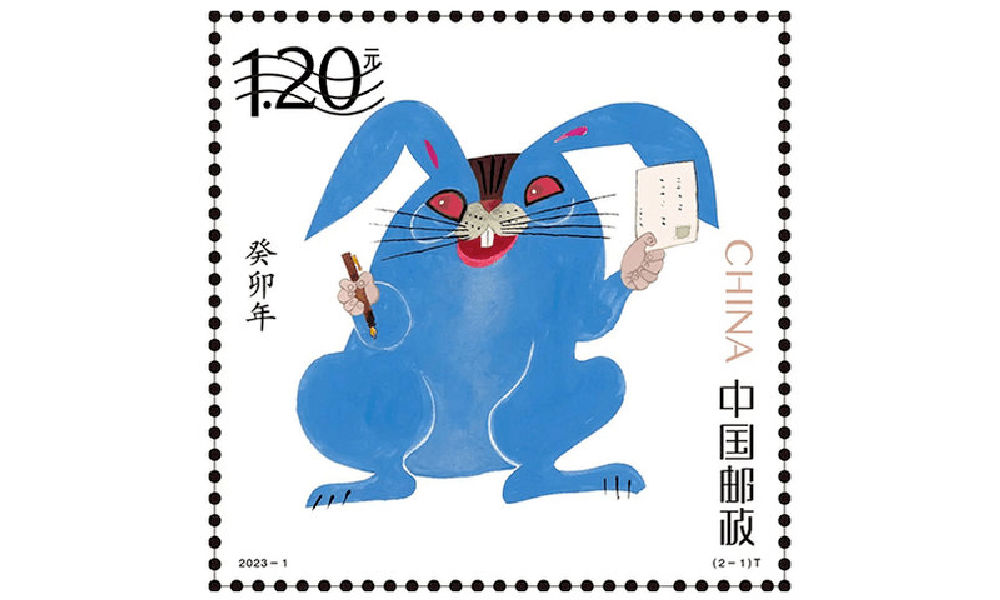
Huang’s (in)famous blue rabbit stamp.
Nevertheless, many people lined up at post offices for the stamps and they immediately sold out.
In light of the controversy, Huang Yongyu spoke about the stamps in a livestream in January of 2023. The 98-year-old artist claimed he had simply drawn the rabbit to spread joy and celebrate the new year, stating, “Painting a rabbit stamp is a happy thing. Everyone could draw my rabbit. It’s not like I’m the only one who can draw this.”
Huang’s response also went viral, with one Weibo hashtag dedicated to the topic receiving over 12 million views (#蓝兔邮票设计者直播回应争议#) at the time. Those defending Huang emphasized how it was precisely his playful, light, and unique approach to art that has made Huang’s work so famous.
A Self-Made Artist
“I’m ugly, but my mum likes me”
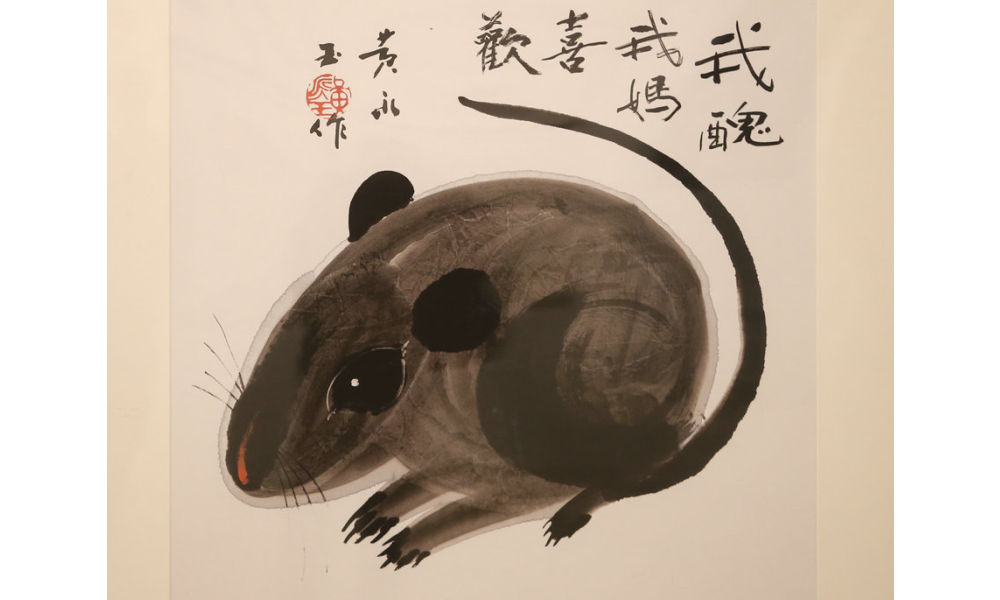
‘Ugly Mouse’ by Huang Yongyu [Image via China Daily].
Huang Yongyu was born on August 9, 1924, in Hunan’s Chengde as a native of the Tujia ethnic group.
He was born into an extraordinary family. His grandfather, Huang Jingming (黄镜铭), worked for Xiong Xiling (熊希齡), who would become the Premier of the Republic of China. His first cousin and lifelong friend was the famous Chinese novelist Shen Congwen (沈从文). Huang’s father studied music and art and was good at drawing and playing the accordion. His mother graduated from the Second Provincial Normal School and was the first woman in her county to cut her hair short and wear a short skirt (CCTV).
Born in times of unrest and poverty, Huang never went to college and was sent away to live with relatives at the age of 13. His father would die shortly after, depriving him of a final goodbye. Huang started working in various places and regions, from porcelain workshops in Dehua to artisans’ spaces in Quanzhou. At the age of 16, Huang was already earning a living as a painter and woodcutter, showcasing his talents and setting the foundation for his future artistic pursuits.
When he was 22, Huang married his first girlfriend Zhang Meixi (张梅溪), a general’s daughter, with whom he shared a love for animals. He confessed his love for her when they both found themselves in a bomb shelter after an air-raid alarm.
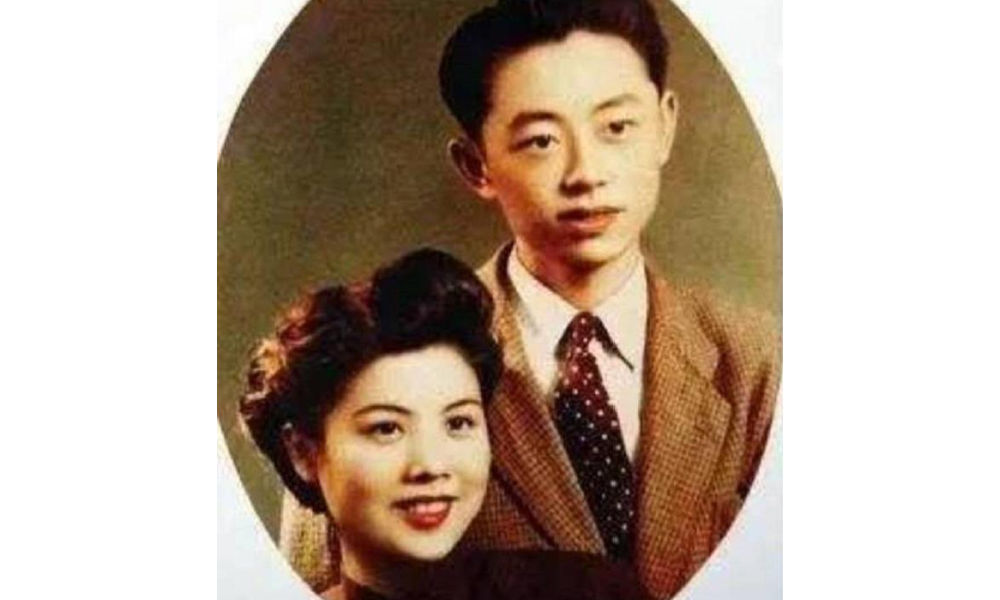
Huang and Zhang Meixi [163.com]
In his twenties, Huang Yongyu emerged as a sought-after artist in Hong Kong, where he had relocated in 1948 to evade persecution for his left-wing activities. Despite achieving success there, he heeded Shen Congwen’s advice in 1953 and moved to Beijing. Accompanied by his wife and their 7-month-old child, Huang took on a teaching position at the esteemed Central Academy of Fine Arts (中央美术学院).
The couple raised all kinds of animals at their Beijing home, from dogs and owls to turkeys and sika deers, and even monkeys and bears (Baike).
Throughout Huang’s career, animals played a significant role, not only reflecting his youthful spirit but also serving as vehicles for conveying satirical messages.
One recurring motif in his artwork was the incorporation of mice. In one of his famous works, a grey mouse is accompanied by the phrase ‘I’m ugly, but my mum likes me’ (‘我丑,但我妈喜欢’), reinforcing the notion that regardless of our outward appearance or circumstances, we remain beloved children in the eyes of our mothers.
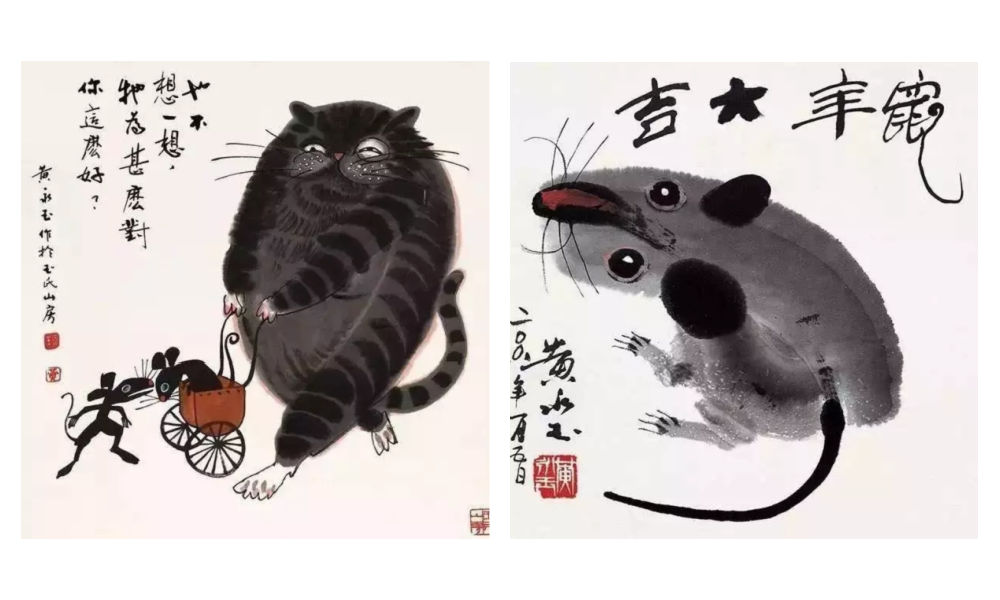
As a teacher, Huang liked to keep his lessons open-minded and he, who refused to join the Party himself, stressed the importance of art over politics. He would hold “no shirt parties” in which his all-male studio students would paint in an atmosphere of openness and camaraderie during hot summer nights (Andrews 1994, 221; Hawks 2017, 99).
By 1962, creativity in the classroom was limited and there were far more restrictions to what could and could not be created, said, and taught.
Bright Colors in Dark Times
“Strengthen my resolve and increase the fun of living”
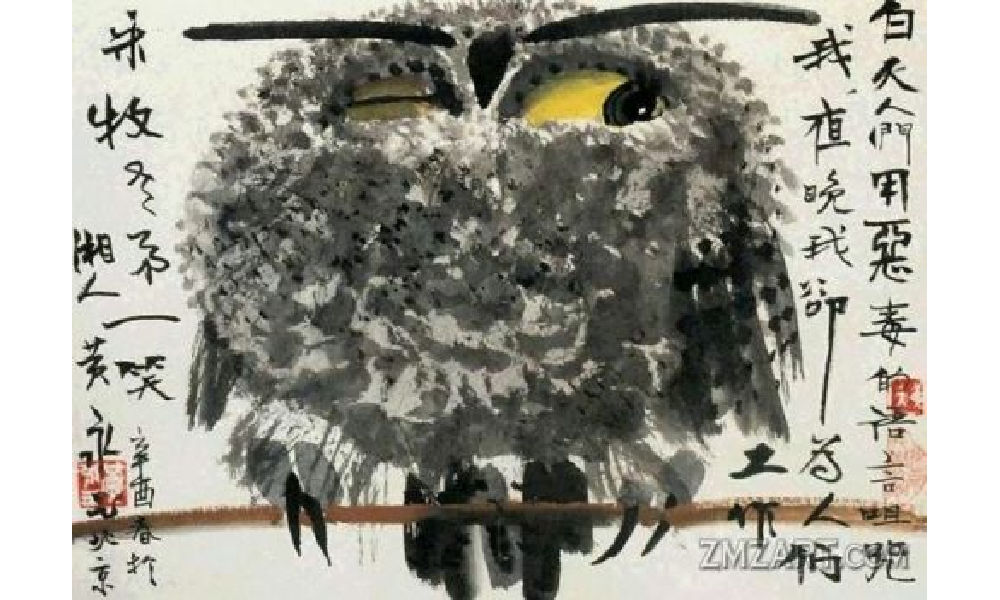
Huang Yongyu’s winking owl, 1973, via Wikiart.
In 1963, Huang was sent to the countryside as part of the “Four Cleanups” movement (四清运动, 1963-1966). Although Huang cooperated with the requirement to attend political meetings and do farm work, he distanced himself from attempts to reform his thinking. In his own time, and even during political meetings, he would continue to compose satirical and humorous pictures and captions centered around animals, which would later turn into his ‘A Can of Worms’ series (Hawks 2017, 99; see Morningsun.org).
Three years later, at the beginning of the Cultural Revolution, many Chinese major artists, including Huang, were detained in makeshift jails called ‘niupeng‘ (牛棚), cowsheds. Huang’s work was declared to be counter-revolutionary, and he was denounced and severely beaten. Despite the difficult circumstances, Huang’s humor and kindness would remind his fellow artist prisoners of the joy of daily living (2017, 95-96).
After his release, Huang and his family were relocated to a cramped room on the outskirts of Beijing. The authorities, thinking they could thwart his artistic pursuits, provided him with a shed that had only one window, which faced a neighbor’s wall. However, this limitation didn’t deter Huang. Instead, he ingeniously utilized vibrant pigments that shone brightly even in the dimly lit space.
During this time, he also decided to make himself an “extra window” by creating an oil painting titled “Eternal Window” (永远的窗户). Huang later explained that the flower blossoms in the paining were also intended to “strengthen my resolve and increase the fun of living” (Hawks 2017, 4; 100-101).
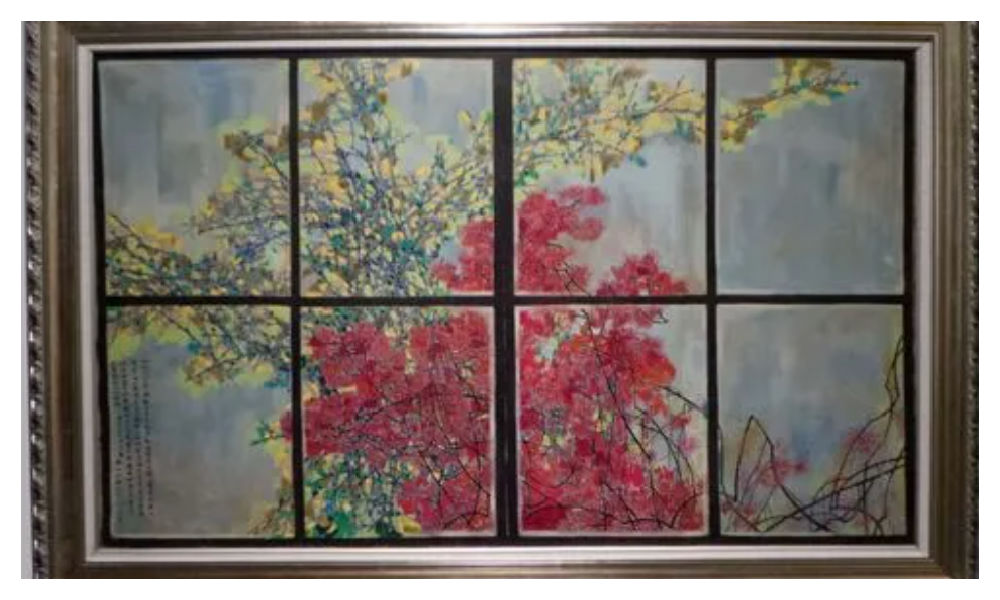
Huang Yongyu’s Eternal Window [Baidu].
In 1973, during the peak of the Cultural Revolution, Huang painted his famous winking owl. The calligraphy next to the owl reads: “During the day people curse me with vile words, but at night I work for them” (“白天人们用恶毒的语言诅咒我,夜晚我为他们工作”) (Matthysen 2021, 165).
The painting was seen as a display of animosity towards the regime, and Huang got in trouble for it. Later on in his career, however, Huang would continue to paint owls. In 1977, when the Cultural Revolution had ended, Huang Yongyu painted other owls to ridicules his former critics (2021, 174).
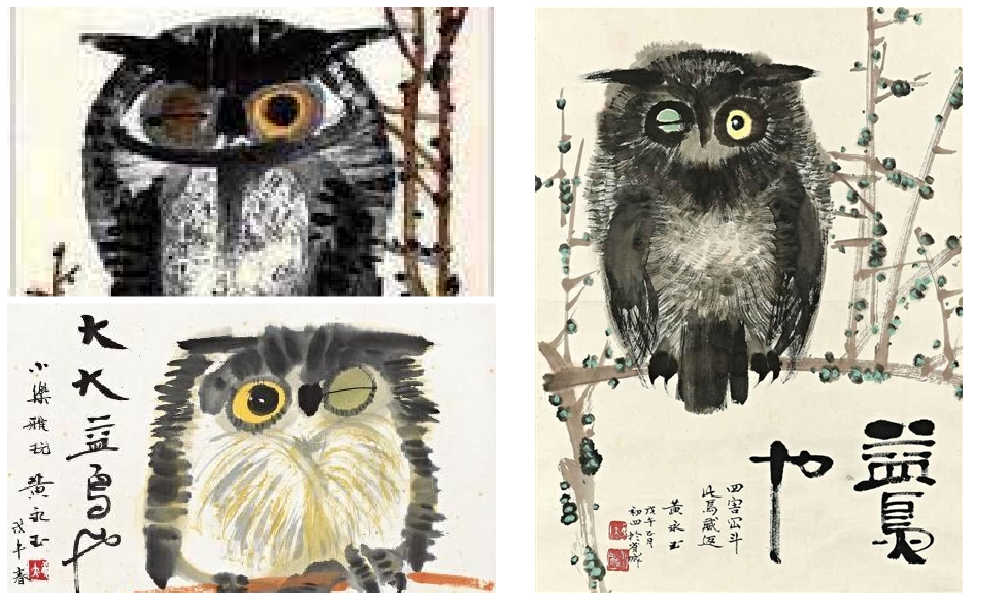
According to art scholar Shelly Drake Hawks, Huang Yongyu employed animals in his artwork to satirize the realities of life under socialism. This approach can be loosely compared to George Orwell’s famous novel Animal Farm.
However, Huang’s artistic style, vibrant personal life, and boundary-pushing work ethic also draw parallels to Picasso. Like Picasso, Huang embraced a colorful life, adopted an innovative approach to art, and challenged artistic norms.
An Optimist Despite All Hardships
“Quickly come praise me, while I’m still alive”

Huang Yongyu will be remembered in China with love and affection for numerous reasons. Whether it is his distinctive artwork, his mischievous smile and trademark pipe, his unwavering determination to follow his own path despite the authorities’ expectations, or his enduring love for his wife of over 75 years, there are countless aspects to appreciate and admire about Huang.
One things that is certainly admirable is how he was able to maintain a youthful and joyful attitude after suffering many hardships and losing so many friends.
“An intriguing soul. Too wonderful to describe,” one Weibo commenter wrote about Huang, sharing pictures of Huang Yongyu’s “Scenes of Pooping” (出恭图) work.
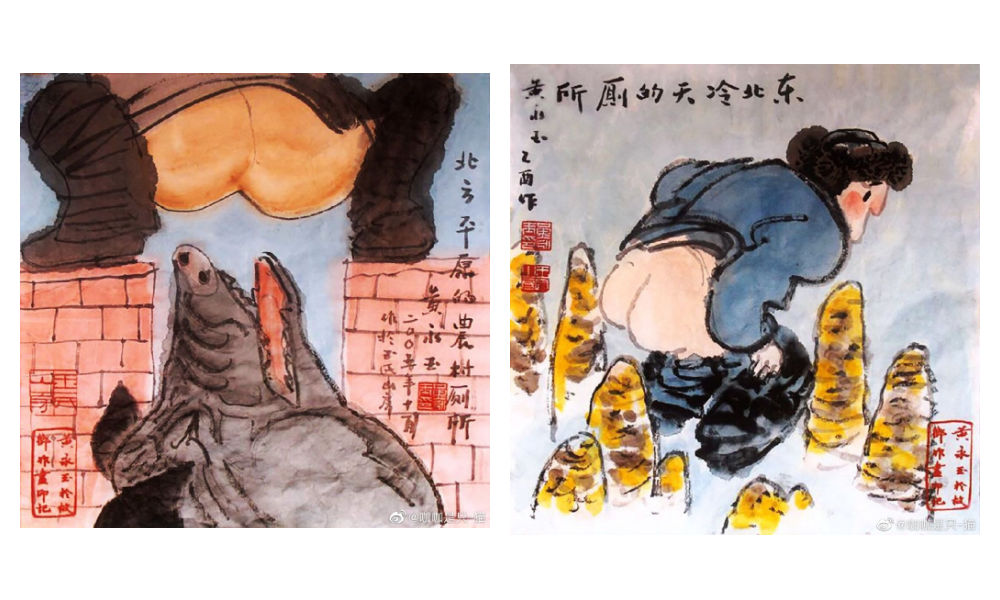
Old age did not hold him back. At the age of 70, his paintings sold for millions. When he was in his eighties, he was featured on the cover of Esquire (时尚先生) magazine.
At the age of 82, he stirred controversy in Hong Kong with his “Adam and Eve” sculpture featuring male and female genitalia, leading to complaints from some viewers. When confronted with the backlash, Huang answered, “I just wanted to have a taste of being sued, and see how the government would react” (Ora Ora).
I'm guessing the 98-year-old Huang loved the controversy. When confronted with backlash for his sculpture featuring male and female genitalia in 2007 Hong Kong, Huang answered, "I just wanted to have a taste of being sued, and see how the government would react." pic.twitter.com/kG0MVVM4SN
— Manya Koetse (@manyapan) June 15, 2023
In his nineties, he started driving a Ferrari. He owned mansions in his hometown in Hunan, in Beijing, in Hong Kong, and in Italy – all designed by himself (Chen 2019).
Huang kept working and creating until the end of his life. “It’s good to work diligently. Your work may be meaningful. Maybe it won’t be. Don’t insist on life being particularly meaningful. If it’s happy and interesting, then that’s great enough.”
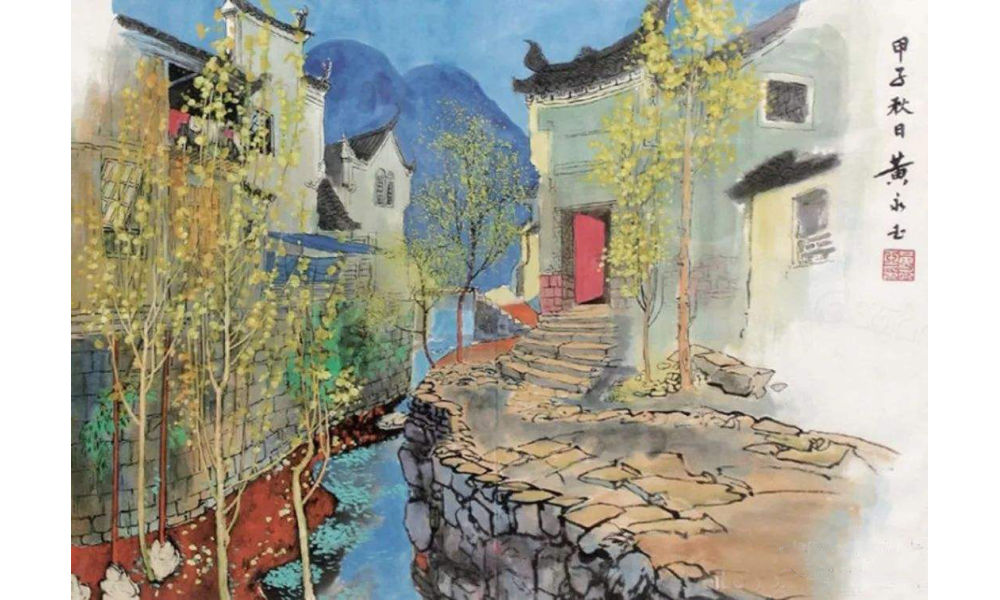
“Hometown Scenery” or rather “Hunan Scenery” (湘西风景) by Huang.
Huang did not dread the end of his life.
“My old friends have all died, I’m the only one left,” he said at the age of 95. He wrote his will early and decided he wanted a memorial service for himself before his final departure. “Quickly come praise me, while I’m still alive,” he said, envisioning himself reclining on a chair in the center of the room, “listening to how everyone applauds me” (CCTV, Sohu).
He stated: “I don’t fear death at all. I always joke that when I die, you should tickle me first and see if I’ll smile” (“对死我是一点也不畏惧,我开玩笑,我等死了之后先胳肢我一下,看我笑不笑”).

Huang with Yiwo (伊喔), the original model for the monkey stamp [Shanghai Observer].
Huang also was not sentimental about what should happen to his ashes. In a 2019 article in Guangming Daily, it was revealed that he suggested to his wife the idea of pouring his ashes into the toilet and flushing them away with the water.
However, his wife playfully retorted, saying, “No, that won’t do. Your life has been too challenging; you would clog the toilet.”
To this, Huang responded, “Then wrap my ashes into dumplings and let everyone [at the funeral] eat them, so you can tell them, ‘You’ve consumed Huang Yongyu’s ashes!'”
But she also opposed of that idea, saying that they would vomit and curse him forever.
Nevertheless, his wife expressed opposition to this idea, citing concerns that it would cause people to vomit and curse him indefinitely.
In response, Huang declared, “Then let’s forget about my ashes. If you miss me after I’m gone, just look up at the sky and the clouds.” Eventually, his wife would pass away before him, in 2020, at the age of 98, having spent 77 years together with Huang.
Huang will surely be missed. Not just by the loved ones he leaves behind, but also by millions of his fans and admirers in China and beyond.
“We will cherish your memory, Mr. Huang,” one Weibo blogger wrote. Others honor Huang by sharing some of his famous quotes, such as, “Sincerity is more important than skill, which is why birds will always sing better than humans” (“真挚比技巧重要,所以鸟总比人唱得好”).
Among thousands of other comments, another social media user bid farewell to Huang Yongyu: “Our fascinating Master has transcended. He is now a fascinating soul. We will fondly remember you.”
By Manya Koetse
Get the story behind the hashtag. Subscribe to What’s on Weibo here to receive our newsletter and get access to our latest articles:
References
Andrews, Julia Frances. 1994. Painters and Politics in the People’s Republic of China, 1949-1979. Berkley: University of California Press.
Baike. “Huang Yongyu 黄永玉.” Baidu Baike https://baike.baidu.com/item/%E9%BB%84%E6%B0%B8%E7%8E%89/1501951 [June 14, 2023].
CCTV. 2023. “Why Everyone Loves Huang Yongyu [为什么人人都爱黄永玉].” WeChat 央视网 June 14.
Chen Hongbiao 陈洪标. 2019. “Most Spicy Artist: Featured in a Magazine at 80, Flirting with Lin Qingxia at 91, Playing with Cars at 95, Wants Memorial Service While Still Alive [最骚画家:80岁上杂志,91岁撩林青霞,95岁玩车,活着想开追悼会].” Sohu/Guangming Daily March 16: https://www.sohu.com/a/301686701_819105 [June 15, 2023].
Hawks, Shelley Drake. 2017. The Art of Resistance Painting by Candlelight in Mao’s China. Seattle: University of Washington Press.
Matthysen, Mieke. 2021. Ignorance is Bliss: The Chinese Art of Not Knowing. Palgrave Macmillan.
Ora Ora. “HUANG YONGYU 黃永玉.” Ora Ora https://www.ora-ora.com/artists/103-huang-yongyu/ [June 15, 2023].
Spotted a mistake or want to add something? Please let us know in comments below or email us. First-time commenters, please be patient – we will have to manually approve your comment before it appears.
©2023 Whatsonweibo. All rights reserved. Do not reproduce our content without permission – you can contact us at info@whatsonweibo.com.
Subscribe

Weibo Watch: The Future is Here

“Bye Bye Biden”: Biden’s Many Nicknames in Chinese

Enjoying the ‘Sea’ in Beijing’s Ditan Park

A Triumph for “Comrade Trump”: Chinese Social Media Reactions to Trump Rally Shooting

Weibo Watch: Get Up, Stand Up

The Tragic Story of “Fat Cat”: How a Chinese Gamer’s Suicide Went Viral

“Old Bull Eating Young Grass”: 86-Year-Old Chinese Painter Fan Zeng Marries 36-Year-Old Xu Meng

A Brew of Controversy: Lu Xun and LELECHA’s ‘Smoky’ Oolong Tea

Singing Competition or Patriotic Fight? Hunan TV’s ‘Singer 2024’ Stirs Nationalistic Sentiments

Zara Dress Goes Viral in China for Resemblance to Haidilao Apron

Weibo Watch: The Battle for the Bottom Bed

About the “AI Chatbot Based on Xi Jinping” Story

China’s Intensified Social Media Propaganda: “Taiwan Must Return to Motherland”

Weibo Watch: Telling China’s Stories Wrong

Saying Goodbye to “Uncle Wang”: Wang Wenbin Becomes Chinese Ambassador to Cambodia
Get in touch
Would you like to become a contributor, or do you have any tips or suggestions? Get in touch here!
Popular Reads
-

 China Insight3 months ago
China Insight3 months agoThe Tragic Story of “Fat Cat”: How a Chinese Gamer’s Suicide Went Viral
-

 China Music4 months ago
China Music4 months agoThe Chinese Viral TikTok Song Explained (No, It’s Not About Samsung)
-

 China Digital10 months ago
China Digital10 months agoToo Sexy for Weibo? Online Discussions on the Concept of ‘Cābiān’
-

 China Arts & Entertainment12 months ago
China Arts & Entertainment12 months agoBehind 8 Billion Streams: Who is Dao Lang Cursing in the Chinese Hit Song ‘Luocha Kingdom’?






TESME
January 26, 2017 at 3:27 am
Fab article – loved Gobi getting a mention!